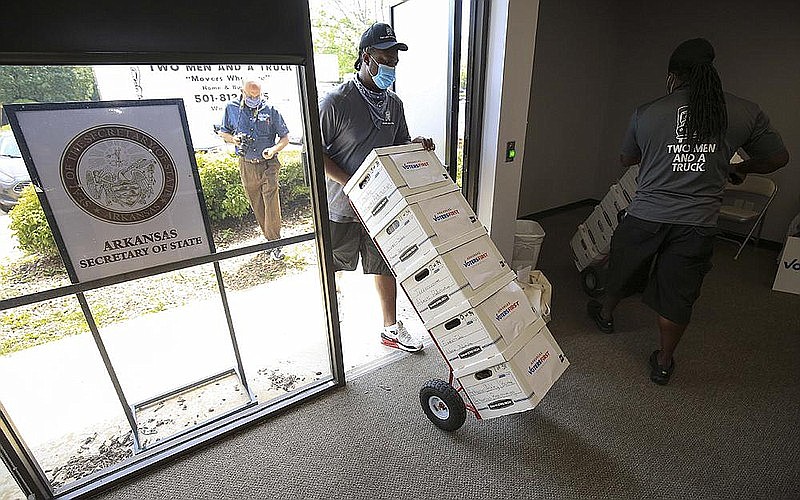In the Nov. 3 election, Arkansas voters will determine the fate of a proposed constitutional amendment that would make it more difficult for citizen-led groups and the Legislature in the future to qualify such proposals for the ballot.
Issue 3 also would make it tougher for citizen-led groups to qualify proposed initiated acts and referendums for the ballot, too.
Arkansas is one of 15 states that allow citizens the ability to collect voter signatures to put a proposed state law, constitutional amendment or referendum on the ballot, according to the University of Arkansas System Agriculture Division's Public Policy Center.
That petitioning ability was first put in place in 1910, although it was not cemented in law until 1925 when the Arkansas Supreme Court upheld Amendment 7 of 1920. That's the constitutional amendment that spelled out the citizen initiative process, the Public Policy Center said in its summary on Issue 3.
Under the constitution, the Legislature also can put proposals before voters. Lawmakers can refer up to three proposed constitutional amendments for the general election ballot. They also can also refer a fourth amendment if it deals with legislative salaries.
Among other provisions, Issue 3 would require initiative or referendum petitions to have a certain percentage of valid signatures of registered voters from each of 45 counties. The designated percentage would be based on the votes in each county in the most recent gubernatorial election.
The constitution now sets that minimum at 15 of Arkansas' 75 counties.
Signatures In 45 Counties
Rep. DeAnn Vaught, R-Horatio, and Sen. Mat Pitsch, R-Fort Smith, sponsored the proposal that's backed by the Arkansas State Chamber of Commerce, Arkansas Farm Bureau and the state Republican Party.
Pitsch said voters should approve Issue 3 because "we have changed our constitution umpteen times over the last few elections."
He said changing the constitution should be a slow and methodical process.
"The majority of those came from the Legislature, [but] we need to make it tougher as well," he said. Most of the ballot measures from citizen-led groups in recent elections have been largely financed with out-of-state funds, he said.
Kristin Foster, chairwoman of the Protect AR Rights committee that opposes Issue 3, said voters should reject Issue 3 because the current process for qualifying ballot measures is solid and "it gives people a voice at the ballot box."
Issue 3 would make it virtually impossible for citizen-led groups to get measures on the ballot, and it would prevent the type of policies enacted through citizen-led initiatives such as raising the state's minimum wage and improving ethics laws, she said.
Medical marijuana was legalized through an initiated constitutional amendment, as was establishing full-fledged casino gambling.
Legislative Vote Threshold Higher
The proposed amendment also would eliminate the 30-day cure period, which gives proposal backers more time to gather signatures if the submitted petitions fall short on valid signatures, but contain at least 75% of the required number.
"It is just another attempt to keep people from having a say in this process," Foster said. "Everyday Arkansans should have a voice in creating policy and laws in our state. Issue 3 would just limit that to politicians and special interest groups."
"That's probably a reach by those who hate the idea" of Issue 3, Pitsch said. "We made it tough on the politicians."
Issue 3 would require a three-fifths vote of legislators - up from the current simple majority vote - to put proposals on the ballot.
That would be at least 60 votes in the 100-member House of Representatives and at least 21 in the 35-member Senate.
Other Changes
The proposed amendment also would:
Require initiative petitions for statewide measures to be filed with the secretary of state by Jan. 15 of the year they would be voted on. They are now required to be filed by four months before the election.
Require a challenge to the sufficiency of a statewide petition to be filed no later than April 15 of the year of the general election in which it shall be voted on.
Foster said many of the signatures for ballot measures are now collected in the spring and summer months at community events and moving the signature deadline to January would put that at a time that people are not even thinking about what is going on the ballot later in that year.
Issue 3 would become effective Jan. 1.

